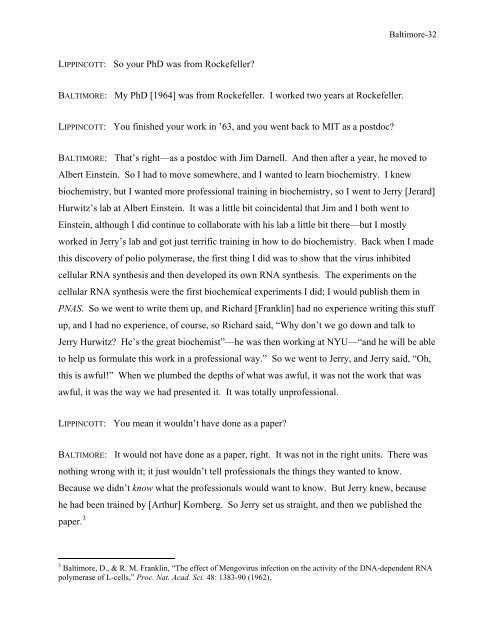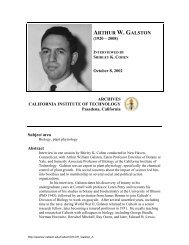Interview with David Baltimore - Caltech Oral Histories
Interview with David Baltimore - Caltech Oral Histories
Interview with David Baltimore - Caltech Oral Histories
You also want an ePaper? Increase the reach of your titles
YUMPU automatically turns print PDFs into web optimized ePapers that Google loves.
<strong>Baltimore</strong>-32<br />
LIPPINCOTT: So your PhD was from Rockefeller<br />
BALTIMORE: My PhD [1964] was from Rockefeller. I worked two years at Rockefeller.<br />
LIPPINCOTT: You finished your work in ’63, and you went back to MIT as a postdoc<br />
BALTIMORE: That’s right—as a postdoc <strong>with</strong> Jim Darnell. And then after a year, he moved to<br />
Albert Einstein. So I had to move somewhere, and I wanted to learn biochemistry. I knew<br />
biochemistry, but I wanted more professional training in biochemistry, so I went to Jerry [Jerard]<br />
Hurwitz’s lab at Albert Einstein. It was a little bit coincidental that Jim and I both went to<br />
Einstein, although I did continue to collaborate <strong>with</strong> his lab a little bit there—but I mostly<br />
worked in Jerry’s lab and got just terrific training in how to do biochemistry. Back when I made<br />
this discovery of polio polymerase, the first thing I did was to show that the virus inhibited<br />
cellular RNA synthesis and then developed its own RNA synthesis. The experiments on the<br />
cellular RNA synthesis were the first biochemical experiments I did; I would publish them in<br />
PNAS. So we went to write them up, and Richard [Franklin] had no experience writing this stuff<br />
up, and I had no experience, of course, so Richard said, “Why don’t we go down and talk to<br />
Jerry Hurwitz He’s the great biochemist”—he was then working at NYU—“and he will be able<br />
to help us formulate this work in a professional way.” So we went to Jerry, and Jerry said, “Oh,<br />
this is awful!” When we plumbed the depths of what was awful, it was not the work that was<br />
awful, it was the way we had presented it. It was totally unprofessional.<br />
LIPPINCOTT: You mean it wouldn’t have done as a paper<br />
BALTIMORE: It would not have done as a paper, right. It was not in the right units. There was<br />
nothing wrong <strong>with</strong> it; it just wouldn’t tell professionals the things they wanted to know.<br />
Because we didn’t know what the professionals would want to know. But Jerry knew, because<br />
he had been trained by [Arthur] Kornberg. So Jerry set us straight, and then we published the<br />
paper. 3<br />
3 <strong>Baltimore</strong>, D., & R. M. Franklin, “The effect of Mengovirus infection on the activity of the DNA-dependent RNA<br />
polymerase of L-cells,” Proc. Nat. Acad. Sci. 48: 1383-90 (1962).

















